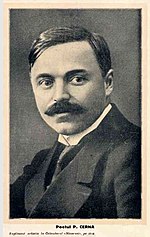Panait Cerna, Date of Birth, Place of Birth, Date of Death
TweetPanait Cerna
Romanian writer and academicAbout Panait Cerna
- Panait Cerna (Romanian pronunciation: [pana'it 't??erna]; Bulgarian: ??????? ?????, Panayot Cherna, born Panayot Stanchov or Panait Staciov; August 26 or September 25, 1881 – March 26, 1913) was a Romanian poet, philosopher, literary critic and translator.
- A native speaker of Bulgarian, Cerna nonetheless wrote in Romanian, and developed a traditionalist style which was connected with Classicism and Neoclassicism.
- Praised by the conservative literary society Junimea, he was promoted by its leader Titu Maiorescu, as well as by Maiorescu's disciples Mihail Dragomirescu and Simion Mehedinti.
- Cerna became the group's main representative during its decline, contributing to both major Junimist magazines, Convorbiri Literare and Convorbiri Critice.
- He also contributed pieces to the traditionalist magazine Samanatorul, and was briefly affiliated with other literary journals. A graduate of the University of Bucharest, Cerna completed his studies in the German Empire.
- There, he attended the University of Berlin and the University of Leipzig, befriending the self-exiled Romanian dramatist Ion Luca Caragiale and the literary critic Paul Zarifopol.
- Cerna died in Leipzig at the age of thirty-one, after a long battle with tuberculosis. Along with various love poems, Panait Cerna's writings also evince his intellectual pursuits.
- This intellectual characteristic earned him a dedicated following, but was criticized by many of his peers, who found it artificial and outdated.
Read more at Wikipedia
See Also
- Famous People's Birthdays on 26 August, Romania
- Famous People's Birthdays in August, Romania
- Famous poet's Birthdays on 26 August, Romania
- Famous poet's Birthdays in August, Romania
- Famous translator's Birthdays on 26 August, Romania
- Famous translator's Birthdays in August, Romania
- Famous journalist's Birthdays on 26 August, Romania
- Famous journalist's Birthdays in August, Romania
- Famous literary critic's Birthdays on 26 August, Romania
- Famous literary critic's Birthdays in August, Romania
- Famous philosopher's Birthdays on 26 August, Romania
- Famous philosopher's Birthdays in August, Romania
- Famous linguist's Birthdays on 26 August, Romania
- Famous linguist's Birthdays in August, Romania


 Date of Birth:
Date of Birth:  Place of Birth: Cerna, Tulcea County, Romania
Place of Birth: Cerna, Tulcea County, Romania